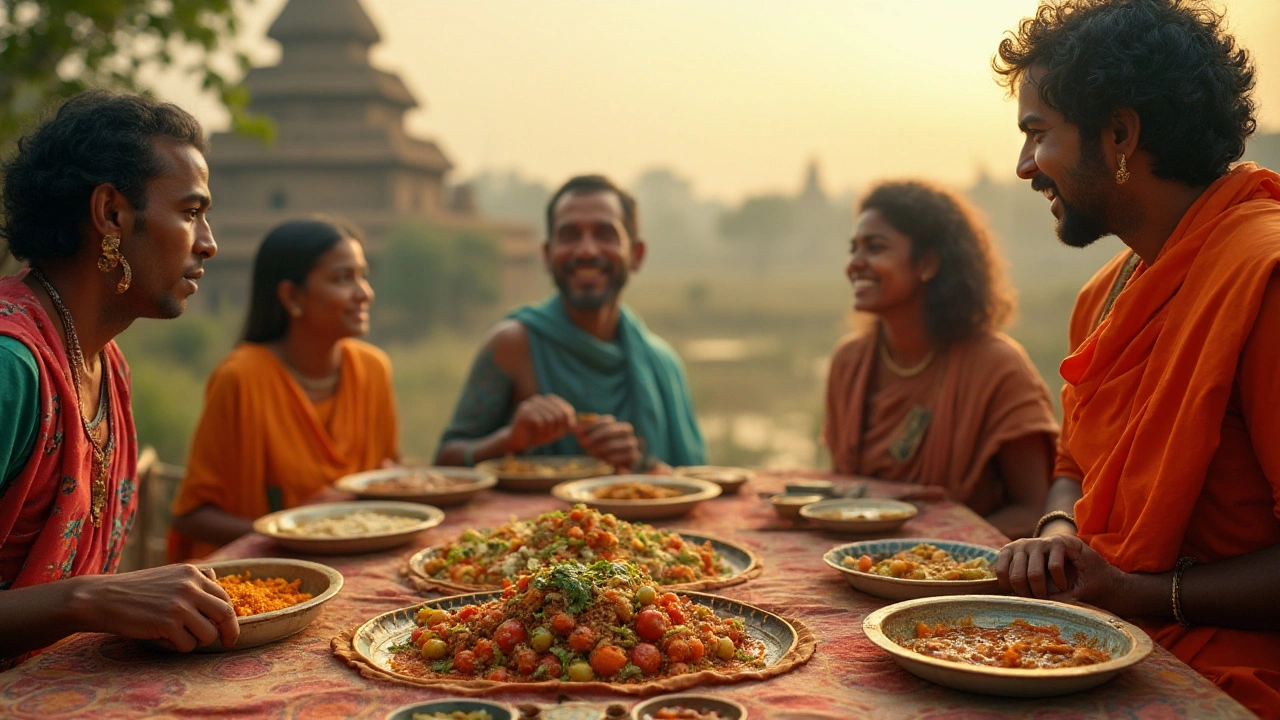In the tapestry of Hindu culture, the question of whether eating eggs is considered a sin weaves a complex narrative that varies across regions, communities, and individual beliefs. To untangle this subject, one must explore the traditional and contemporary dietary practices observed in Hinduism.
India, with its rich diversity, harbors a multitude of interpretations relating to vegetarianism, shaped by religious texts, familial traditions, and local customs. While many Hindus adhere to a vegetarian diet, the inclusion of eggs can depend heavily on the nuanced beliefs held by different sects and families. Some view eggs as non-vegetarian, thereby abstaining, while others may see them as an acceptable food choice.
This investigation into the role of eggs in Hindu dietary laws invites reflection on how these beliefs have evolved over time. It raises awareness about how personal choices regarding food are deeply intertwined with an individual’s cultural and religious identity.
- Hinduism and Dietary Practices
- Historical Context of Vegetarianism
- Regional Variations in Beliefs
- Religious Interpretations of Eating Eggs
- The Modern Perspective on Eggs
- Personal and Cultural Food Choices
Hinduism and Dietary Practices
Hinduism, one of the oldest religions in the world, embraces a vast spectrum of beliefs and practices, particularly when it comes to diet. Sacred texts, such as the Vedas and Upanishads, offer guidance on living a life of dharma, which often touches upon food choices. In Hinduism, dietary practices are not just about nutrition but are considered an important aspect of spiritual well-being. The concept of ahimsa, or non-violence, deeply influences Hindu dietary rules. This principle encourages the abstention from harming living beings, leading many followers to adopt a vegetarian lifestyle.
Vegetarianism in Hinduism is often distinguished by the avoidance of certain non-vegetarian foods, including meat and at times, eggs. This is based on the belief that consuming such foods accumulates bad karma and disrupts spiritual growth. While not all Hindus avoid eggs, many do, considering them closely related to meat due to their potential to nurture life. This links back to the principle of non-harming living creatures, resonating with the teachings of major Hindu deities and figures.
Notably, dietary practices can vary drastically among different sects and regions. For instance, Vaishnavism, a popular Hindu sect, often recommends strict vegetarianism, which may include the avoidance of eggs.
“In practicing non-violence towards sentient beings, one cultivates a pure mind free from pollutants,” recounts a verse that echoes in many Vaishnava teachings.On the flip side, some sects, like the Shaktas, may not strictly enforce these dietary restrictions, and cultural practices might adapt accordingly.
The religious significance of food in Hinduism is also reflected in rituals and offerings, where purity is considered paramount. This purity isn't just physical but symbolic as well, with food often being offered to deities before consumption. Such practices highlight the belief that food joins the eater with the divine when consumed with devotion and gratitude, which amplifies the importance of choosing the right foods. Therefore, notions of purity play a pivotal role in the decision to consume or avoid items such as eggs.
Today, as Hindu communities spread globally, the interpretation of dietary practices continues to evolve. Migration and cultural exchanges influence personal beliefs about what constitutes a permissible diet within Hinduism. Although the central tenets remain grounded in ancient scriptures, modern Hindus may integrate their traditional beliefs with contemporary practices, leading to diverse approaches to vegetarianism.
Historical Context of Vegetarianism
The roots of vegetarianism in Hinduism trace back to ancient India, a country where dietary choices have long been influenced by religious doctrines and philosophies. Many pivotal religious texts, such as the Vedas and later scriptures like the Upanishads, mention principles that favor non-violence or Ahimsa. This principle deeply informs the diets of many Hindus, encouraging a lifestyle that avoids harm to all living beings, hence the preference for a vegetarian diet.
Historically, the dietary habits of Hindus were shaped not only by religious prescriptions but also by socio-economic statuses and geographical factors. For instance, in the Vedic period, it was common for some rituals to include meat offerings, yet this gradually shifted as the idea of Ahimsa gained prominence. Geographical variations across India led to diversified interpretations of these dietary laws. Communities living in fertile regions with abundant plant life naturally leaned towards vegetarianism, simply because of the easier access to plant-based foods.
The arrival of Buddhism and Jainism, both of which emphasize non-violence, contributed to the strengthening of vegetarian practices among Hindus. Jainism, especially, with its strict non-violence tenets, advocated for a diet that avoided harm to even the smallest forms of life. This influence spread across regions and permeated the practices of various Hindu communities.
Interestingly, as the political landscape of India evolved, so did dietary regulations. During the Mauryan Empire in the third century BCE under Emperor Ashoka, who converted to Buddhism, the propagation of vegetarianism intensified. Edicts against animal sacrifice were issued, which encouraged more humane practices. The influence of prominent leaders can't be understated, and Ashoka's reign exemplifies how political endorsements altered the spiritual and cultural landscapes over time.
In fact, a quote from Mahatma Gandhi captures the essence of vegetarianism's historical significance in Hinduism:
"To my mind, the life of a lamb is no less precious than that of a human being. I hold that, the more helpless a creature, the more entitled it is to protection by man from the cruelty of man."This statement reiterates the spiritual imperative felt by millions to follow a vegetarian diet as a form of compassion, a central ethos in Hinduism's rich history.
Through centuries, these influences converged, forming a foundation where vegetarianism became synonymous with Hinduism, especially in the eyes of the world. While interpretations may vary and evolve, the historical context of vegetarianism within Hinduism remains rooted in the essence of true non-violence, which continues to guide many today in their dietary choices.

Regional Variations in Beliefs
The vast and culturally diverse landscape of India means that beliefs surrounding dietary practices, including the consumption of eggs, vary significantly across different regions. In northern India, especially in states like Rajasthan and Gujarat, traditional Jain practices have a profound influence on Hindu vegetarianism. Here, many adherents exclude eggs from their diet as Jain dietary laws strictly prohibit the consumption of any living organisms, which includes eggs due to their potential for life. These beliefs permeate local Hindu communities, who often adopt similar practices, refraining from eating not just flesh but also any potential animal products.
Meanwhile, in the eastern states such as Bengal, eggs are often seen in a different light. Bengal's predominantly fish-eating population considers eggs as a benign food item, rather akin to vegetables in terms of dietary classification. Here, the culinary tradition embraces a more lenient stance, reflecting a broader view that balances religious adherence with dietary preferences suited to the region's environmental conditions and historical legacy of diverse influences.
In the southern part of India, states like Tamil Nadu and Kerala exhibit a mix of practices. Some communities strictly follow vegetarianism due to strong Vaishnavite and Shaivite influences, which discourage the consumption of eggs. However, coastal communities, influenced by years of maritime trade and different cultural influxes, may integrate eggs into their diets, viewing them as a source of nourishment and practicality in cuisine.
It is noteworthy that in western India, particularly in Maharashtra, religious practice can add another layer of complexity. While some Maharashtrians adhere to strict vegetarianism, including abstention from eggs, others might partake due to a more modern interpretation of dietary laws where eggs are seen as a nutritious necessity, especially in urban areas where lifestyle and accessibility influence food choices.
The wide array of beliefs highlights how geography, local culture, and historical contact with other regions shape dietary norms. As noted by cultural anthropologist Dr. R.N. Sharma, "Food beliefs in India are like its rivers, diverging and converging, influenced by the land and people they touch."
"The diversity in India's religious practices allows for a varied interpretation of purity, which inevitably extends to dietary habits," says researcher Anjali Patel.
Religious Interpretations of Eating Eggs
Religious interpretations in Hinduism regarding the consumption of eggs are as diverse and intricate as the belief system itself. The complexity arises because Hinduism does not advocate a single, unified doctrine but rather embraces a wide spectrum of philosophies. In many Hindu traditions, particularly among Brahmins who often follow a strict vegetarian diet, eggs are typically classified as non-vegetarian. This distinction is primarily based on the belief that eggs, like meat, are potential sources of life and hence are not consumed. These dietary choices are not mere health considerations but deeply ingrained spiritual practices rooted in the principles of ahimsa, or non-violence. This tenet encourages followers to avoid harming living beings, an ethos that naturally extends to food choices.
Across various sects and regions, the interpretation of what constitutes vegetarianism can differ. For example, in some South Indian communities, eggs are occasionally consumed despite the religious prohibition against meat. The reasoning here may be a more flexible interpretation of what constitutes harm or the acknowledgment of eggs as a nutrient-rich food. The vegetarianism practiced by these communities is often influenced by historical economic conditions, with eggs providing an accessible source of protein. These practices are not static; they have evolved over time to accommodate contemporary societal needs.
While scriptures like the Manusmriti and the Bhagavad Gita provide guidelines on non-violence and dietary norms, interpretations differ significantly. In some texts, there is emphasis on personal choice and the intention behind consumption, suggesting that it is not merely the act of eating eggs that matters but the consciousness with which one approaches their diet.
"The real essence of spiritual life is not what you consume, but the purity of your thoughts and actions," some spiritual leaders note, highlighting the individual's path to understanding their relationship with food.Despite these flexible viewpoints, a considerable portion of the Hindu population strictly adheres to traditional vegetarianism, abstaining from eggs and other forms of non-vegetarian food, viewing such practices as a means to spiritual purity.
Complicating these interpretations are the socio-economic factors that influence dietary habits. In urban settings, where global dietary influences blend with local traditions, younger generations of Hindus may view eggs as a pragmatic food choice, balancing cultural traditions with modern health and nutritional needs. A recent survey indicated that almost 30% of young urban Hindus have adopted a diet that includes eggs, reflecting a shift towards more personalized religious and ethical considerations. This change demonstrates a remarkable adaptability in Hindu dietary practices, where ancient traditions are reinterpreted to suit contemporary lifestyles while still honoring their original tenets. Ultimately, the decision to consume eggs is deeply personal, influenced by a tapestry of religious teachings, cultural contexts, and individual beliefs, illustrating the fascinating dynamism of Hindu dietary customs.

The Modern Perspective on Eggs
In today's globalized world, dietary practices are in flux, evolving as rapidly as the societies they underscore. For many Hindus, new revelations prompt introspective examination of age-old beliefs. Though the traditional abstention from eggs persists in various regions, urbanization and exposure to diverse cultures and cuisines have steered many towards a different narrative. As younger generations grow in increasingly multicultural environments, they often encounter varied dietary habits which can shift personal attitudes towards food.
Younger urban Hindus might view eggs not as an affront to their beliefs, but as a valuable source of nutrition, rich in proteins and essential vitamins. This shift isn't merely about tastes but also about understanding nutritional needs and health benefits. As dieticians and health experts uncover more about the significance of balanced diets, eggs, with their dense nutrient pack, sometimes make a case for inclusion. It can’t be ignored that fitness enthusiasts often advocate for the consumption of eggs because they provide high-quality proteins essential for muscle repair and growth.
Moreover, many modern Hindus differentiate between fertilized and unfertilized eggs, permitting the latter due to the fact that they do not result in the taking of life. This distinction is crucial in reframing eggs as less of a moral conundrum. As eloquently put by a renowned Indian nutritionist, Dr. Shanti Patel:
"The decision to eat eggs can rest on not just religious beliefs, but also on individual health requirements and ethical considerations."Such perspectives reflect the dynamic nature of dietary evolution amid the religious framework of Hinduism.
Additionally, exposure to dietary practices from around the world contributes to this changing perspective. As Indian society progressively integrates with global communities, culinary exchanges become inevitable. Many Hindus living abroad adapt to local diets, sometimes incorporating eggs, not as a rebellion against tradition, but as a means to embrace a balanced nutritional intake. However, the personal choice to consume eggs often remains a private one, reflecting an individual's unique synthesis of cultural heritage, religious belief, and nutritional insight.
The shifting perspective towards eggs also hints at the broader movement within India’s vegetarian faction towards a more flexible dietary approach. Here's a glimpse into this trend:
- Approximately 30% of Indian vegetarians consume eggs, their choices influenced by health and fitness causes.
- There's an upward trend over the past decade, with some communities reinterpreting vegetarian norms to include egg consumption.
- Educational institutions, particularly in urban areas, often promote egg consumption due to their affordability and nutrient-rich profile.
Personal and Cultural Food Choices
Food choices in India, especially concerning the consumption of eggs, significantly vary across different households and communities. Many people’s diets are intricately tied to their backgrounds, religious beliefs, and cultural influences. In Hinduism, the perspective on eating eggs can be quite personal, often reflecting one's upbringing and the specific traditions of their family. For some, the choice to include eggs in their diet is a matter of practicality and nutrition, considering eggs as a source of protein, especially in urbanized areas where busy lifestyles demand quick and easy nutrition.
For traditionalists, however, eggs might be perceived as a non-vegetarian item and thus refrained from, rooted in the belief that they are embryonic forms of life. This view aligns with the principles of ahimsa, or non-violence, which is a central ethos in many Hindu practices. But beliefs do not exist in a vacuum. They evolve with changing social narratives and globalization. Today, many younger generations within Hindu families are leaning towards a pragmatic approach, evaluating eggs not just as a diet choice, but as a nutritional requirement, often influenced by global dietary trends.
It's important to recognize how deeply personal these choices can be; they often reflect a balance between respect for tradition and the need for modern practicality. Locality also plays a role in dietary habits. In certain southern and coastal states like Kerala and Bengal, eggs are commonly consumed even among those who identify as vegetarian, due to historical availability and culinary traditions.
As Mahatma Gandhi highlighted, “What we eat has a profound impact on how we conduct ourselves, both mentally and spiritually.”Such insights reveal the complexities of aligning traditional beliefs with modern lifestyles.
The diversity within Hindu practices and beliefs allows for a wide variety of food choices, pointing to the fact that even within a single religion, cultural expressions can vastly differ. This acceptance can be seen as a metaphor for the broader diversity that India celebrates. In many instances, the discourse surrounding eggs as a food choice is more than a dietary conversation; it’s about negotiating identity, tradition, and personal choice within the framework of one’s cultural heritage.
